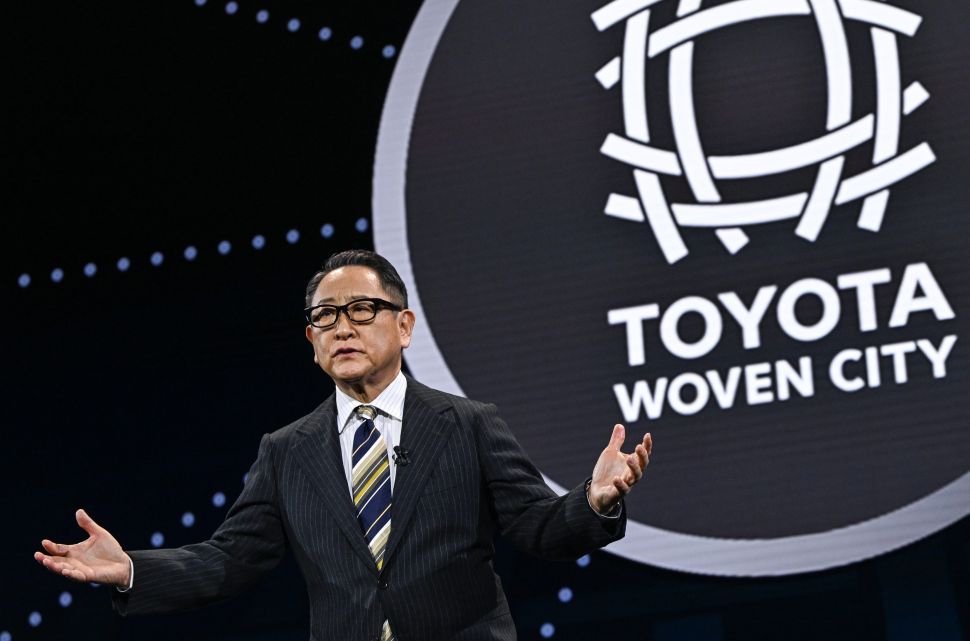Akio Toyoda, Chairman of Toyota Motor Corporation” width=”970″ height=”641″ data-caption=’Akio Toyoda delivers an address at the Consumer Electronics Show (CES) 2025, showcasing the company’s latest innovations in Las Vegas, Nevada, on Jan. 6, 2025. <span class=”lazyload media-credit”>Anadolu via Getty Images</span>’>
Akio Toyoda, grandson of Toyota Motors’ founder Kiichiro Toyoda, is leading a $33 billion effort to take private Toyota Industries—one of the automaker’s largest and oldest suppliers. The deal carries deep symbolic weight: Toyota Industries was the original parent company of Toyota Motors. Founded by Kiichiro Toyoda in 1926, Toyota Industries spun off Toyota Motors as a separate entity in 1937. Now, nearly a century later, Akio Toyoda is reclaiming the ancestral core of the Toyota empire—at a significant discount—tightening the founding family’s grip on the world’s largest automaker.
Both Toyota Motors and Toyota Industries are subsidiaries within the Toyota Group conglomerate. Today, Toyota Industries is the world’s largest manufacturer of forklifts.
Akio Toyoda, 69, currently serves as chairman of Toyota Motors. He led the company as CEO and president for 14 years before stepping down in 2023. He was succeeded by Koji Sato, a non-family executive who had previously served as CEO of Toyota’s luxury division, Lexus, for seven years.
At $33 billion, the offer came in well below the $42 billion investors had anticipated, prompting criticism that Akio Toyoda may be engineering a discounted buyout to benefit Toyota Group leadership at the expense of shareholders. “The tender offer price is very low compared to our estimate of intrinsic value,” said David Mitchinson, chief investment officer at Zennor Asset Management and a Toyota Industries investor, in an interview with Yahoo Finance. He added that there is “strong opposition” from shareholders.
Still, the offer represents a premium over Toyota Industries’ stock price before the deal was made public in April. Toyota executives argue the valuation is fair and reflects that premium. They also suggest investors may have artificially inflated expectations in the lead-up to the announcement, which may explain why shares dropped more than 10 percent this week following the official offer.
The buyout raises other concerns as well. Control of Toyota Industries will now shift to Toyota Fudusan, an unlisted real estate firm that serves as the Toyoda family’s private investment vehicle and where Akio Toyoda is also chairman. Toyoda is contributing just ¥1 billion—roughly $7 million—of his personal wealth to the deal, with the rest funded by Toyota Fudusan, Toyota Motors and loans from Japan’s largest banks.
In an effort to dispel concerns that the deal is a power grab by the founding family, a senior Toyota Motors executive—formerly the company’s CFO—stated during an online briefing, “The chairman’s involvement isn’t about control over the business, it’s about his commitment to the deal, to provide support on the ground and to the betterment of Japan.”
According to a press release, the three parties involved say the buyout is intended to “deepen collaboration within Toyota Group.” The group operates a complex network of companies and subsidiaries. In recent years, Japan’s government has pressured conglomerates to improve corporate governance by unwinding these structures—particularly so-called “parent-child listings,” where both a parent company and its subsidiary are publicly traded. In such cases, like that of Toyota Motors and Toyota Industries, shareholder value can be diminished. The Toyota Group has acknowledged these governance concerns and says it is taking steps to address them.

